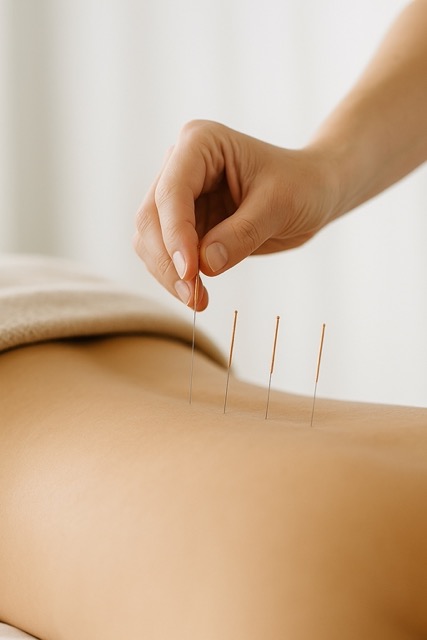Acupuncture for Pain Relief

Acupuncture is increasingly recognised as one of the most effective complementary treatments for chronic pain relief. Modern research shows that acupuncture stimulates the brain, activates natural pain-relieving pathways, and promotes the release of endorphins; the body’s own “feel-good” chemicals that help block pain signals and support relaxation.
This powerful combination of neuroscience and Traditional Chinese Medicine (TCM) explains why acupuncture is widely used for neck pain, knee pain, back pain, arthritis, migraines, sports injuries, and other chronic pain conditions.
Scientific Evidence: Acupuncture and Endorphin Release
Endorphin activation
Laboratory and clinical studies confirm that acupuncture triggers the release of endogenous opioids (endorphins and enkephalins). For example, Han (2004, Neurosci Lett) demonstrated that electroacupuncture at different frequencies increases the release of specific endorphins and dynorphins, directly reducing pain perception [PubMed: 15135942]. Earlier work also found raised levels of β-endorphins in cerebrospinal fluid following acupuncture in patients with pain (Clement-Jones et al., 1980, Lancet) [PubMed: 6107591].
Brain imaging studies
Modern brain imaging has shown how acupuncture influences pain networks. Using functional magnetic resonance imaging (fMRI), researchers demonstrated that acupuncture modulates activity in regions such as the anterior cingulate cortex, insula, thalamus, and prefrontal cortex; areas directly involved in pain processing and emotional regulation (Zhang et al., 2019, Front Neurosci) [Front Neurosci: 10.3389/fnins.2019.00100]. These findings support the idea that acupuncture alters central nervous system function, not just local sensation.
Comprehensive reviews
Systematic reviews and meta-analyses further support these mechanisms. A large patient-level meta-analysis (Vickers et al., 2012, Arch Intern Med) concluded that acupuncture is significantly more effective than both usual care and sham acupuncture for chronic pain [PubMed: 22965186]. More recent reviews describe how acupuncture stimulates the release of endorphins, serotonin, dopamine, norepinephrine, and neurohormones, all of which contribute to pain modulation and improved wellbeing (Nielsen et al., 2022, Front Pharmacol) [PMC: PMC9434305].
Traditional Chinese Medicine (TCM) View of Pain
In TCM theory, pain arises when the flow of Qi (energy) and Blood is obstructed in the body’s meridians. Causes include:
- Qi stagnation – often stress or tension leading to distending pain.
- Blood stasis – trauma or poor circulation, producing sharp, fixed pain.
- Cold and Damp invasion – environmental factors leading to heaviness and stiffness.
- Qi and Blood deficiency – weakness or chronic illness, producing dull, lingering pain.
Acupuncture works by unblocking Qi and Blood, warming the channels, clearing Damp, and strengthening deficiencies.
Successful Pain Management at YUE Acupuncture Clinic
At YUE Acupuncture Clinic in Colchester, we have helped many patients achieve lasting pain relief through Traditional Chinese Medicine and acupuncture. Here are just a few examples of our patients’ experiences:
“I was suffering from shoulder pain for quite some time until I decided to try acupuncture and cupping with Dr Yue. From the very first treatment I felt amazing improvement. Dr Yue is professional, friendly, and I absolutely recommend her.”
— Tiago C. See full testimonial ›
“I’ve had back, shoulder and tennis elbow issues that plagued me for years and was dubious about acupuncture before visiting Dr Yan. However, after just a few sessions the pain gradually eased, and I now have considerably free movement in my joints.”
— Steven B. More success stories
“Would definitely recommend if you suffer from neck and upper arm pain. I had been to several chiropractors, but acupuncture has been so much better.”
— Christine B. Read more reviews ›
Conclusion
Scientific evidence shows that acupuncture stimulates the release of endorphins and other neurotransmitters, while brain imaging confirms its effect on central pain-regulating networks. From a TCM perspective, acupuncture restores the smooth flow of Qi and Blood to reduce pain at its root.
For those seeking natural, drug-free pain relief in Colchester and Essex, acupuncture offers a safe, effective, and holistic approach supported by both modern science and thousands of years of TCM practice.
References
- Han JS. Acupuncture and endorphins. Neurosci Lett. 2004;361(1-3):258-261. [PubMed: 15135942]
- Clement-Jones V, McLoughlin L, Tomlin S, Besser GM, Rees LH, Wen HL. Increased beta-endorphin but not met-enkephalin levels in human cerebrospinal fluid after acupuncture for recurrent pain. Lancet.1980;2(8201):946–949. [PubMed: 6107591]
- Zhang Y, et al. Default Mode Network as a Neural Substrate of Acupuncture: Evidence from fMRI Studies. Front Neurosci. 2019;13:100. [doi:10.3389/fnins.2019.00100]
- Vickers AJ, et al. Acupuncture for chronic pain: individual patient data meta-analysis. Arch Intern Med.2012;172(19):1444-1453. [PubMed: 22965186]
- Nielsen A, Wieland LS, Cochrane S, et al. Acupuncture as an evidence-based strategy for acute pain management. Front Pharmacol. 2022;13:9434305. [PMC: PMC9434305]
